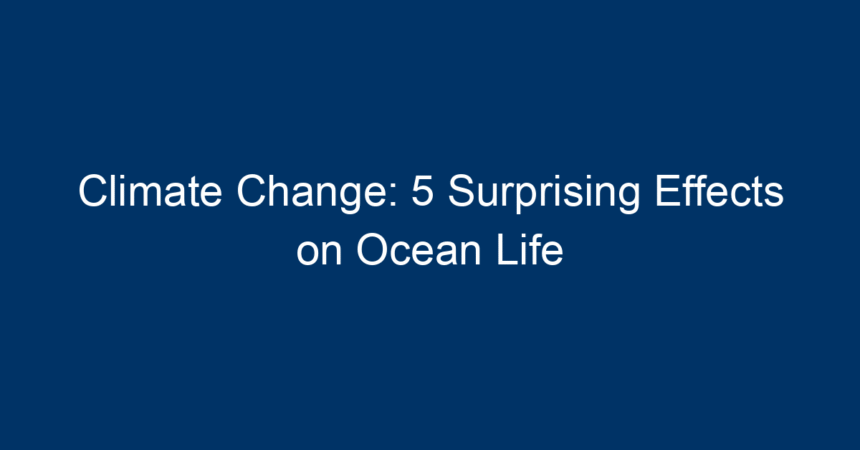As the world faces the escalating challenges of climate change, one of the most profound impacts is being felt underwater. Our oceans, which cover over 70% of the Earth’s surface, are undergoing significant transformations, affecting marine ecosystems and the myriad forms of life they support. While the common narrative often focuses on rising sea levels and warmer temperatures, the effects of climate change on ocean life are deeply intricate and, in many respects, surprising. In this article, we will explore five unexpected consequences of climate change on marine organisms and ecosystems, shedding light on why this issue deserves urgent attention.
1. Coral Bleaching: The Lost Rainbow
Understanding Coral Bleaching
Coral reefs are often referred to as the "rainforests of the sea" due to their biodiversity. However, climate change has led to a phenomenon known as coral bleaching. When water temperatures rise even slightly, corals expel the vibrant algae living in their tissues, which provide them with energy and color. The result? A stark, bleached appearance that threatens coral health.
The Surprise Element
What’s shocking is that coral bleaching not only affects the corals themselves but also the entire marine ecosystem. Many fish species rely on coral reefs for shelter and food. For example, studies have shown that a single bleaching event can reduce fish populations by as much as 60%. As fish populations dwindle, the impacts ripple throughout the food chain, affecting predators and disrupting local fishing communities.
2. Ocean Acidification: The Silent Intruder
The Chemistry of Change
As the atmosphere warms due to climate change, our oceans absorb excess carbon dioxide (CO2). This process leads to ocean acidification, where seawater becomes more acidic, posing a drastic threat to marine life. Shellfish, corals, and other calcium carbonate-dependent organisms struggle to maintain their shells and structures, leading to weakened populations.
Unexpected Consequences
The surprise here lies in the extent of ocean acidification’s impact. While it’s commonly known that shellfish are at risk, many might not realize how this affects entire food webs. For instance, species like plankton, the foundation of the marine food chain, are also vulnerable. A decline in plankton populations can have devastating effects on larger marine life, ranging from fish to whales, ultimately disrupting ecosystems and food sources for humans.
3. Shifts in Species Distribution: A Game of Tag
The Migration Phenomenon
Climate change is altering the habitats of numerous marine species, forcing them to migrate to cooler waters. Fish, for example, are shifting their ranges poleward as temperatures rise. This movement can be particularly surprising for those who assume that marine life is static.
Ecological Implications
The unexpected effect of this migration is the disruption of local ecosystems and fisheries. Species that once thrived in certain regions may decline, while others may flourish, leading to imbalances. For instance, the cod populations in the North Atlantic have decreased significantly due to overfishing and shifting water temperatures, impacting local fishing industries and economies.
4. Altered Reproductive Patterns: Timing is Everything
The Reproductive Cycle
Climate change is not just shifting where marine species live; it is also altering their reproductive cycles. Warmer waters can accelerate breeding seasons for some species but disrupt the timing for others that rely on specific environmental cues.
The Impact on Populations
This phenomenon can be particularly surprising for species like sea turtles, which use temperature cues to determine nesting times. If these cues change, it can lead to mismatches in hatching times, potentially resulting in fewer surviving offspring. A study on loggerhead turtles in the Mediterranean found that changes in sea temperature could lead to reduced hatching success, emphasizing the interconnected nature of environmental changes and reproductive success in marine ecosystems.
5. Increased Marine Disease: A Hidden Peril
The Rise of Pathogens
The warming of ocean waters has also been linked to increased outbreaks of diseases among marine life. Changes in temperature and salinity can create favorable conditions for pathogens, often resulting in devastating effects on species like corals and shellfish.
Consequences on Ecosystems
Perhaps the most surprising aspect of this effect is the potential for widespread mortality in marine populations. For instance, a surge in the spread of coral disease due to elevated sea temperatures has been documented in various regions. This not only affects coral health but also threatens the entire reef ecosystem, impacting local fisheries and tourism industries that depend on healthy coral reefs for their survival.
Conclusion: The Path Forward
The effects of climate change on ocean life are both alarming and intricate. From coral bleaching and ocean acidification to shifting species distributions and increased disease, it’s clear that our oceans are experiencing profound changes that could have lasting impacts on marine ecosystems and human livelihoods.
Actionable Insights
-
Educate Yourself and Others: Understanding the nuances of climate change and its effects on ocean life is crucial. Share information with friends and family to raise awareness.
-
Reduce Carbon Footprint: Individual actions, such as using public transport, reducing energy consumption, and supporting renewable energy, can collectively contribute to lowering carbon emissions.
-
Support Sustainable Practices: Choose sustainably sourced seafood and support organizations working towards ocean conservation.
-
Advocate for Change: Engage with local policymakers and advocate for policies that address climate change and protect marine life.
- Participate in Clean-Up Activities: Get involved in local beach clean-ups or initiatives aimed at preserving marine habitats.
By taking these steps, we can contribute to the health of our oceans and the myriad forms of life they support, helping ensure a sustainable future for generations to come. Let’s work together to combat climate change before its effects become irreversible.




